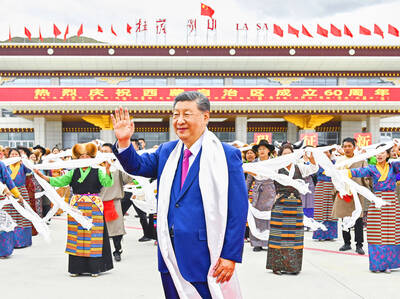The number of people in China who can't read has shot up to 116 million, wiping out years of hard-won gains against illiteracy as rural poor leave the farm and school for work in the city, state media said yesterday.
Over the last five years, China's illiterate population grew by 30 million, the China Daily reported. According to census data, 87 million adults were illiterate in 2000.
Literacy in China is defined as someone who can read and write 1,500 characters -- a fraction of the 7,000 to 10,000 characters required for college graduates.
Most Chinese were illiterate at the beginning of the 20th century, but the simplification of Chinese characters and education campaigns launched by the communists helped steadily raise literacy levels among adults, hitting about 90 percent in 2000, according to the UN.
The paper quoted an official as saying the main reason for the backsliding was that many young rural poor were dropping out of school to find work in the cities.
Migrant workers in urban centers do not have access to public education, health care and other basic social services.
"The situation is worrying," the paper quoted Gao Xuegui, a Ministry of Education official who focuses on illiteracy, as saying. "Illiteracy is not only a matter of education, but also has a great social impact."
Gao said lack of funding was another reason for the backsliding, and the fact that earlier successes in fighting illiteracy lead some local governments to abandon their literacy programs.
The China Daily said China's illiterate population in 2000 accounted for 11.3 percent of the world's total, but reached 15.01 percent in 2005.

Ten cheetah cubs held in captivity since birth and destined for international wildlife trade markets have been rescued in Somaliland, a breakaway region of Somalia. They were all in stable condition despite all of them having been undernourished and limping due to being tied in captivity for months, said Laurie Marker, founder of the Cheetah Conservation Fund, which is caring for the cubs. One eight-month-old cub was unable to walk after been tied up for six months, while a five-month-old was “very malnourished [a bag of bones], with sores all over her body and full of botfly maggots which are under the

BRUSHED OFF: An ambassador to Australia previously said that Beijing does not see a reason to apologize for its naval exercises and military maneuvers in international areas China set off alarm bells in New Zealand when it dispatched powerful warships on unprecedented missions in the South Pacific without explanation, military documents showed. Beijing has spent years expanding its reach in the southern Pacific Ocean, courting island nations with new hospitals, freshly paved roads and generous offers of climate aid. However, these diplomatic efforts have increasingly been accompanied by more overt displays of military power. Three Chinese warships sailed the Tasman Sea between Australia and New Zealand in February, the first time such a task group had been sighted in those waters. “We have never seen vessels with this capability

A Japanese city would urge all smartphone users to limit screen time to two hours a day outside work or school under a proposed ordinance that includes no penalties. The limit — which would be recommended for all residents in Toyoake City — would not be binding and there would be no penalties incurred for higher usage, the draft ordinance showed. The proposal aims “to prevent excessive use of devices causing physical and mental health issues... including sleep problems,” Mayor Masafumi Koki said yesterday. The draft urges elementary-school students to avoid smartphones after 9pm, and junior-high students and older are advised not

Chinese President Xi Jinping (習近平) attended a grand ceremony in Lhasa yesterday during a rare visit to Tibet, where he urged “ethnic unity and religious harmony” in a region where China is accused of human rights abuses. The vast high-altitude area on the country’s western edge, established as an autonomous region in 1965 — six years after the 14th Dalai Lama fled into exile — was once a hotbed for protest against Chinese Communist Party rule. Rights groups accuse Beijing’s leaders of suppressing Tibetan culture and imposing massive surveillance, although authorities claim their policies have fostered stability and rapid economic development in